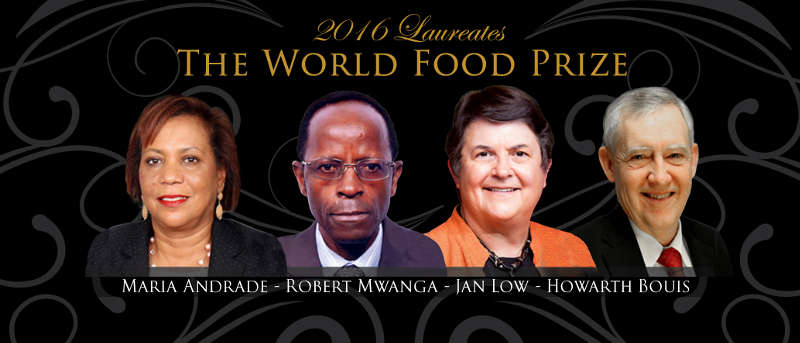Three International Potato Center (CIP) scientists, Jan Low, Maria Andrade, and Robert Mwanga, along with Howarth Bouis of HarvestPlus will be awarded the World Food Prize in recognition of their combined success in improving nutrition and health through biofortified crops. The World Food Prize Laureates who will share the $250,000 prize equally.
“These four scientists have changed the lives of millions through their efforts,” said CIP Director General Barbara Wells. “They made the case that orange-fleshed sweet potato would be accepted in various African diets, they bred resilient nutritious sweet potatoes that people liked, and now the evidence shows that these communities are healthier as a result.”
The World Food Prize, which will be formally awarded in Des Moines, Iowa in October, is the most prominent global award for individuals whose breakthrough achievements alleviate hunger and promote global food security.
About 150 million people worldwide have a vitamin A deficiency. In Sub-Saharan Africa and Asia, vitamin A deficiency is a leading cause of blindness, disease and premature death among children under five. Pregnant and lactating women are also at high risk of vitamin A deficiency.
The orange-fleshed sweet potato (OFSP) is a great source of vitamin A. Just 125 grams daily of fresh roots from most orange-fleshed varieties contain enough beta-carotene to prevent childhood blindness. CIP, which adopted sweet potato as a mandate crop in 1988, began working on introducing vitamin A rich, orange-fleshed sweet potato in 1995 as most dominate varieties in the sub-Saharan region are white-fleshed, having no beta-carotene.
Andrade and Mwanga are plant scientists in Mozambique and Uganda who have dedicated over 15 years to breeding the vitamin A-enriched OFSP using genetic material from CIP and dominant local varieties.
Low structured the nutrition studies and programs that, together with a multidisciplinary team of breeders, agronomists, seed specialists and social scientists from CIP and partners, has resulted so far in more than two million households in 10 separate African countries planting and consuming this nutritionally fortified food.
According to CIP, the acceptance of orange-fleshed sweet potato by African consumers required education at the community level and in the fields where farmers learned best farming practice to ensure that disease free, tolerant, and nutritious OFSP varieties were available.
“The CIP team found early on that children loved the orange sweet potatoes,” said Oscar Ortiz, CIP deputy director general of research and development. “When children eat orange-fleshed sweet potatoes in the first 1,000 days of their lives, they can combat many of the symptoms of hidden hunger like blindness and weakened immune systems.”
Bouis, the founder of HarvestPlus, pioneered the implementation of a multi-institutional approach to biofortification as a global plant breeding strategy. As a result of his leadership, crops such as iron and zinc fortified beans, rice, wheat and pearl millet, along with vitamin A-enriched OFSP, cassava and maize are being tested or released in more than 40 countries.
To learn more, visit CIP.











